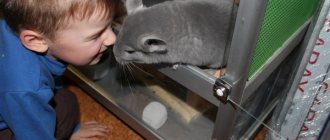What types of domestic rats are there?
Rodent species standards are set by many organizations around the world.
We will focus on the AFRMA Fancy Rats classification of the American Rat and Mouse Association. Rodents come in white, black, brown, gray and beige. There are more than 15 color options in total AFRMA Fancy Rats - Self. Sometimes spotted individuals are found. The eyes of animals can be black, ruby, or red. When determining a variety, these characteristics are usually not taken into account. Experts look at the shape of the ears, the structure of the tail, and the presence and type of fur.
There are seven varieties of AFRMA Fancy Rats in total.
Rat standard
The animal's fur AFRMA Fancy Rats - Varieties tightly covers the body and shines. It should be short and smooth. Males have slightly longer and stiffer hairs than females.
Photo: alexeisido/Shutterstock
Rex rat
This species has curly hairs on its body. The coat should be thick and soft. Curly whiskers are normal for these rodents.
Photo: Colin Seddon/Shutterstock
Tailless rat
Such animals can have any color and coat structure. The main feature is the absence of a tail.
Photo: George Dolgikh/Shutterstock
Sphinx
These rats are hairless. They have thin, almost transparent skin. It can be pink, gray or spotted. Normally, there are no scars or pimples on it, but wrinkles are allowed. The ears are large and smooth. The mustache is usually short and curly. Although they may not exist at all.
Photo: RaulRamirez/Shutterstock
Satin, or satin, rat
The fur of these animals is long, straight and fine. It may appear to be sparkling. The hair is pleasant to the touch. The mustache is usually wavy.
Photo: Sergey Bezgodov / Shutterstock
Dumbo Rat
A distinctive feature of the variety is its large round ears. They are set low on the sides of the head. But the wool can be any kind.
Photo: JLRphotography/Shutterstock
Bristle rat
These rodents have slightly wavy fur. With age she becomes rougher and straighter. It feels like a metal brush. The mustache can be straight or wavy at the tips.
Photo: Carlos Aranguiz/Shutterstock
Potassium permangantsovka
Potassium permanganate is used almost everywhere: small children are bathed with it, they drink it for intestinal disorders, it is used for disinfection, and much more. In addition, potassium permanganate copes with the destruction of stench much better than some odor neutralizers. Therefore, if a rat died under the floor or behind a wall, and the corpse began to emit a stench, potassium permanganate is perfect.
To remove the smell, it will be enough to simply wash the floors and baseboards in those places where rats most often ran, and spray it into those places (cracks) where the corpse of a rodent may be located. In addition, potassium permanganate will also destroy most of the harmful bacteria that parasites might leave behind, so the risk of becoming infected with something in the future is reduced to zero.
Potassium permanganate (potassium permanganate)
What is the character of domestic rats?
Rodents are attached to their owners. They are recognized by their voice 5 reasons why you'd love a pet rat! and appearance. Animals enjoy Rat Personality, Intelligence, and Care when owners scratch them behind the ears, pet them, and massage their backs. At such moments, rats often begin to chatter their teeth. This means that the pet is happy. Some animals “look after” their owners: they lick and gently bite their hands.
When humans are not around, rodents need the company of their own kind. Animals enjoy playing together and cleaning each other.
It is better to keep rats in same-sex pairs Caring for your rat. Otherwise, they will often bear offspring: there are eight cubs in a litter.
Females are active and mischievous. They love to explore new places and run. Males are a little calmer. They can sit relaxed in their owner's arms while he watches TV.
Rodents are very smart. They quickly learn to call and perform simple Rats tricks! The Perfect Pet? . For example, jumping through a hoop or playing with a ball.
Remember: Rats sometimes bite Rats! The Perfect Pet? . This can happen if there are cubs in the home, a stranger has stuck a finger into the cage, the owner’s hands smell of food, or the animal is scared because it was suddenly picked up. Therefore, wash your hands before touching a rodent. Don't tease him with food. Be careful if there are babies in the cage. Try not to remove animals from their home too quickly. First, say something to the rat, pet it. If your pet is scared or injured, wrap it in a towel. Only then take him out of the cage. Hold your pet every day. Otherwise, it will lose the habit and stop trusting you.
How to get rid of the pungent odor of males
It is impossible to get rid of the smell of a male. Every animal has its own natural scent. If its smell increases, then it is needed for something in nature. For example, to attract a female during the mating season. Attempts to wash it off by bathing will cause the body of a male rat to begin to produce the desired aroma with a vengeance, so it is better to focus on regular cleaning of the cage and purchasing high-quality litter.
If you keep your pet clean and it is not sick, then there will be no unpleasant odors. Be sure to pay due attention to the hygiene and health of your pet, as well as its living conditions. If you are afraid that your pet will stink, then opt for another type of animal.
Source
What living conditions are required for decorative rats?
It is best to place the rat in a spacious wire cage Caring for your rat. Height - no less than 50 cm, minimum floor area - 50 × 80 cm. The flooring must be hard and even, for example plastic. The option with rods will not work: the animal may damage its paws.
Photo: borisenkoket/Shutterstock
There are several rules for placing a house. Rodents are susceptible to cold and heat. They feel best at a temperature of 20 degrees. Therefore, the cage is usually placed away from direct sunlight, radiators and drafts. If there are other animals in the house, then the home should be, for example, on the Rat: Species Profile nightstand or table.
A nipple drinker and bowls must be placed inside the cage. If desired, you can buy a tray and filler for rodents. The rat should also have a shelter: a hammock or a house.
Photo: Bilanol/Shutterstock
Rodents love toys very much. For entertainment, owners choose running wheels, tunnels, platforms and wooden figures. The latter should be changed regularly, otherwise the animal will get bored.
Rats like to make nests. Therefore, you can periodically put paper in the cage. Remember that newspaper sheets will not work. The ink can cause poisoning to your pet.
Degu
Degus are rare domestic rodents, very active, cute, easily tamed animals. This rodent, like a chinchilla, needs a spacious cage with a house, a drinking bowl, a wheel and other toys for active games. A degu should always have specialized food in its feeder consisting of herbs, cereals and vegetables, as well as hay and branches for grinding down teeth. But sweet fruits and dried fruits are contraindicated for these rodents due to their predisposition to diabetes.
Degus are very sociable and get used to the hands of their owner and can recognize him by smell. This pet is a social animal, so it requires constant communication either with other degus or with its owner. Therefore, if you do not have enough time for your pet, buy him a pair.
What to feed pet rats
These rodents are omnivores. What should I feed my pet rat? , but you still need to control their diet. The simplest food option is dry balanced food. These are sold in pet stores. Before purchasing, you should carefully study the composition. The protein content should be at least 16%, fat - 4-5%.
The diet can be varied with vegetables and fruits. Pears, apples, bananas, melons, broccoli, cabbage, carrots, celery and peas are considered safe.
Treats you can give your rat are grains, grains, seeds, bread, cookies, sweets and breakfast cereals. But you shouldn’t treat your rodent with them too often.
Here's what you should absolutely not give to pet rats:
- blue cheeses;
- green bananas;
- raw potatoes and their skins;
- licorice;
- Orange juice;
- mango;
- raw artichokes;
- avocado;
- raw beans and peanuts;
- rhubarb;
- raw red cabbage and Brussels sprouts;
- dried fruits;
- peanut butter.
Regardless of what is in the bowl, the rodent should always have clean, fresh water in the bowl.
How to care for a decorative rat
There are several tips that will help make your rodent's life more comfortable.
Get out of the cage
The pet needs cleanliness. If the home is dirty, the animal may develop a Cleaning Your Pet Rats' Cage lung infection.
Once a day, remove feces from the tray or corner that the animal has chosen as a toilet. Lightly wipe the cage with a damp cloth.
If there is litter, replace it with fresh litter every week. Remove toys and bowls from the cage. Treat them with a non-toxic disinfectant spray. It is sold in pet stores. After this, you should rinse the accessories with hot water, dry them and put them back.
General cleaning of the home is carried out once a month. Repeat the same things you do every day and once a week. Then disassemble the structure and spray with an antibacterial agent. Rinse with water and dry.
Let the rat out of the cage
The rodent should run and play outside the cage for at least an hour a day. The room in which the animal spends time needs to be prepared Caring for your rat. Close windows and doors before letting your pet out. If there are gaps in the floor, between the baseboards and the walls, plug them with something. Remove plants and wires.
Trim your claws
This procedure must be carried out Rat: Species Profile once every two months. You will need special scissors for this. You can buy them at a pet store.
Photo: Vector Up / Shutterstock
To do everything right, hold the claw up to the light. You will see a translucent tip, this is what you need to cut off. Just above this process is the pink part. These are blood vessels and nerve endings; they cannot be touched. If damaged, the animal will be in pain and will bleed. If this happens, apply some cornstarch to the wound.
Bathe the rat
Usually the animal cleans its fur with its paws. Normally it shouldn't smell bad. If a strong smell appears, it means that the cage has not been cleaned for a long time or the rodent is sick.
The animal needs to be washed How to Bathe Your Pet Rat Without Stress in extreme cases. For example, if chewing gum or other unsafe substance is stuck to the hairs. For the procedure you will need warm water, special shampoo from a pet store and a towel. While bathing, the animal must be held: rats do not like water.
The main rule is not to wet your head and eyes.
If your pet really doesn’t like the process, treat him to a piece of apple or pear. This will distract the animal from unpleasant emotions.
Duration of decomposition
Everyone wonders how long it takes for a rat to decompose. Because no one can tolerate the terrifying smell for long. The situation is complicated by the fact that the corpse of a rat takes from 6 to 10 weeks to decompose. The process depends on temperature conditions. The hotter the room, the faster this will all end.
On a note!
Mummifying substances are added to modern rat poison for such cases. The body does not rot and dries slowly. The situation may develop differently. If a rat eats an insufficient dose of rat poison to trigger the mummification process. In this case, the remains rot for up to 2 months; the decomposition process is long.
What to do if a rat died under the floor is an individual decision. You can try to solve the problem yourself or entrust it all to specialists.
What do domestic rats suffer from?
Most rodents do not suffer from any disorders during their lives. But you still need to monitor your pet’s condition. Sometimes animals develop the following abnormalities Keeping your rat happy and healthy:
- Tumors. Females and all older individuals are at risk. Most often, the tumor can be removed.
- Parasites: ticks and fleas. The main symptoms are itching and rash. You may need a medicated shampoo.
- Too long teeth. They grow back if the animal does not grind them off on hard vegetables or wooden toys. This makes it difficult for rats to eat and drink.
- Respiratory diseases. A rodent can be a carrier of mycoplasma, which lives in the respiratory system. The microorganism leads to a fatal infection. The disease is identified by red spots on the nose and around the eyes, sneezing and wheezing.
- Obesity. Excess weight can cause your pet to have problems with its paws. Life expectancy is decreasing. To avoid deviation, you need to exclude fatty and sweet foods.
In order to notice violations in time, the rat should be examined every day. Normally, there are no bumps on the body, the fur is smooth and shiny, and the rodent has a good appetite.
If you notice any changes, take your pet to the veterinarian.
There are diseases that are dangerous not only for rodents, but also for humans. According to the American Veterinary Medical Association, domesticated rats sometimes infect They're intelligent and friendly. Why some people think rats are the perfect pet, for fun and comfort. people with leptospirosis, salmonellosis and fever. These abnormalities are almost never seen, and people rarely die from them.
To avoid catching a disease from a rat, you should try to avoid bites and wash your hands immediately after contact with the animal. If the animal does bite you, wash the wound with warm water and soap. Dry with a towel, apply antibiotic cream or ointment, and apply a bandage for a short time.











